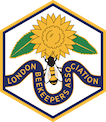
|
London Beekeepers' Association |

|
London Beekeepers' Association |
March in the Apiary[In the apiary, month by month.] Howard Nichols March is a time of increasing activity within the hive but it all depends upon the weather. For the beekeeper it is also a month of increasing anticipation. At the time of writing it is still very cold and (as usual) rainy but assuming the weather improves then the colony at the end of March should be a substantially different entity from the one at the beginning. The intervening days can include warm, sunny days, which encourage plants to flower early, and bees to forage. The weather can just as easily revert back to cold. The former causes the bees to produce more brood and the latter to retreat back to a cluster. The main job of the beekeeper is still to keep an eye on stores. Old "winter" bees are starting to die off and new bees are being born. Food reserves are decreasing but demand for food will substantially increase. The bees will be using energy flying on warmer days but mainly bringing in pollen, not nectar. They also need to keep the brood at a higher temperature (about 35°C) which also uses more energy. Stores can quickly be depleted in March and early April. The first warm day from the start of March is an opportunity to have a quick look inside the hive. If so, then this will constitute the 1st inspection of the new season. The new colony card should be made up and inspection details recorded. Minimum temperature should be 10°C for a quick look but without taking out brood frames. If there is an exceptionally warm day with the temperature 14°C or more then a detailed colony inspection may be made. Otherwise, better to leave this until April. If an inspection is not possible, then observing the colony entrance will provide invaluable information. If the bees are bringing in pollen, purposefully entering and leaving (flying a beeline) then these are always good signs. If the bees are aimless, listless or without purpose on a warm day then all may not be well. Other jobs to doMonitoring varroa mites. This is a good time to monitor the mite drop. Leave the inserts in for a week and count the mite drop. If >2 mites per day then some action will be needed in Spring. If >7 mites per day then action is immediately required. The National Bee Unit produces an excellent booklet "Managing Varroa" which is available for free download. There is also comprehensive information about varroa on the NBU website, including an online varroa count calculator. Siting your bees. Those who were on the LBKA mentoring schemes last year and have not yet acquired bees (but will do so) should prepare the hive and site. If acquiring bees by means of the purchase of a nucleus from a supplier then the order should have been placed by now. Demand often exceeds supply. Formulate a beekeeping plan for the season. This need not be elaborate and may be such as improving swarm control, attempting a new manipulation, maximising honey production (ensuring there is the maximum number of flying bees in the colony when the honey flow starts), etc. The opportunities are endless but it is good to have a basic plan and to use this to increase beekeeper learning. Finally, on a sad note, if you find your bees have died out then it is imperative to close the entrance to prevent robbing. Make a note of what you observe then remove and destroy dead bees and frames. Sterilise the hive parts. It is important to try to find out why the bees have died. Winter and early spring colony losses seem to average 20\% to 30\% so you are not alone. It does not always mean it's the beekeeper's fault but it is essential to analyse and learn. Examples of reasons include, but are not limited to, the varroa mite (the number 1 offender), lack of stores, damp / inadequate hive ventilation, site situated in a frost pocket, failing queen, poorly mated queen. On a more optimistic note, the beekeeping season arrives in March. We have several eventful months ahead. I sincerely hope that all of us have a productive season and achieve whatever aims and goals we aspire to! |
©2024 London Beekeepers' Association |